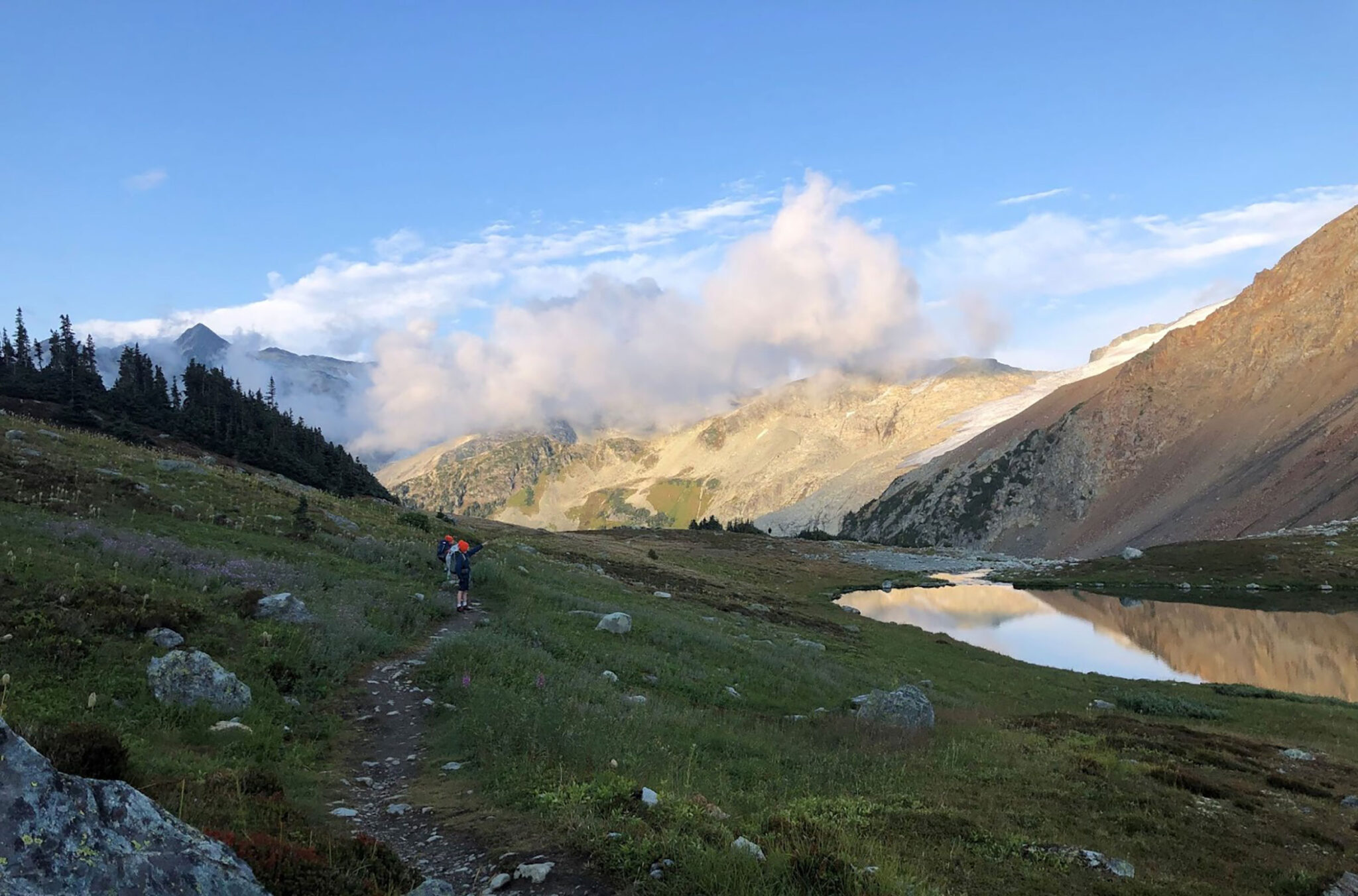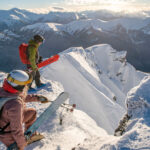Cool, pine air filled my lungs, drops of rain rolled down my face and wind tickled my ears as the sun slipped behind the misty mountains. Dark clouds loomed overhead and fog descended as if someone was setting the scene for the next blockbuster, fantasy movie.
I had two options, return home and give up on hiking to Russet Lake or keep on walking to what I knew would be a day filled with breathtaking views. I turn to my family, my mom and dad still look hopeful, and my younger sister is looking at me expectantly. We walk on.
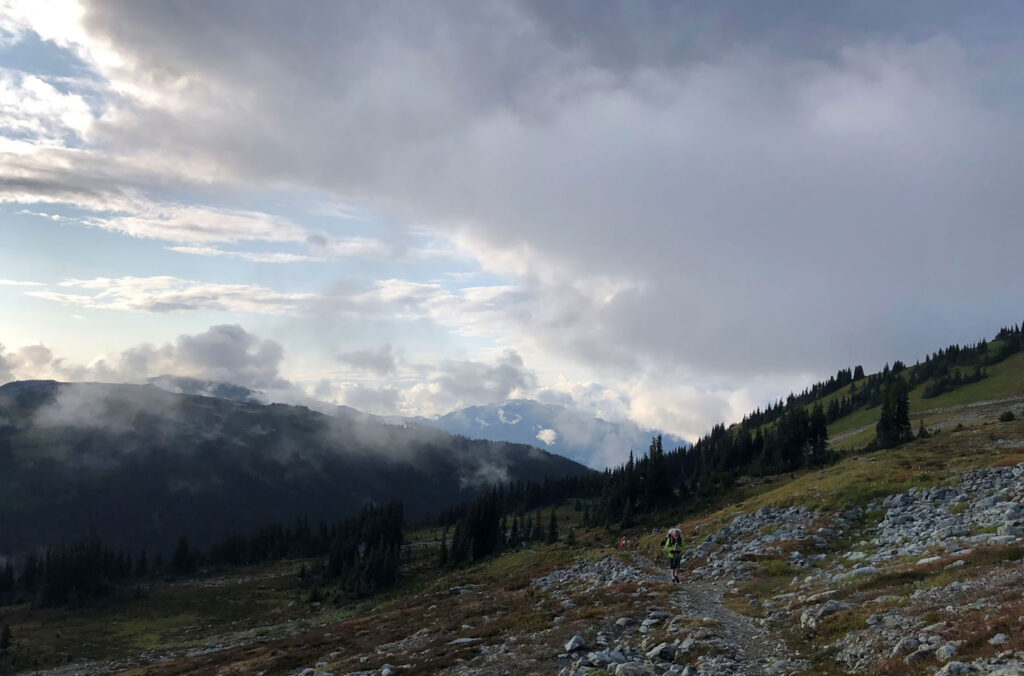
Where is Russet Lake?
Growing up in Whistler, I’m aware that it’s famous for its world-class skiing and biking, big mountain adventures, alpine lakes, and the Olympics, you get the picture. But it’s also full of hidden gems that take time to discover. One of these is the hike to Russet Lake, which is perched under the towering Fissile Peak in Garibaldi Provincial Park along the Spearhead Traverse.
You can find Fissile Peak on the Whistler Blackcomb hiking trail map right at the top. From the top of the Peak Express, you can either take Matthew’s Traverse and the Half Note Trail which hits the High Note Trail or opt for the High Note Trail all the way to Musical Bumps. You’ll be passing the aptly named Piccolo, Flute and Oboe peaks on your way. The hike to Russet Lake isn’t so much about the lake itself, it’s more about the incredible journey and views along the way.
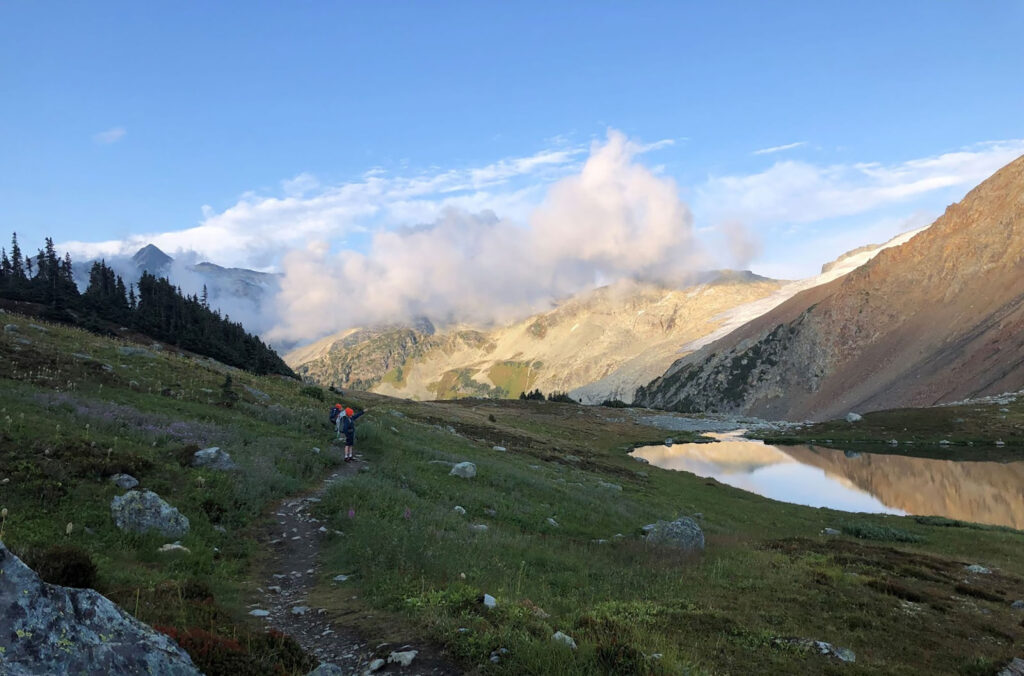
This is not an easy hike, I’d give it a black trail rating that requires the right planning and gear. It’s around a 12-kilometre hike with consistent elevation gain, which takes around four to six hours one way from the top of Whistler Mountain (using the gondola system and Peak Express). Although you could go there and back within one day you wouldn’t get time to soak in the lush forests and dramatic mountain landscapes, so I suggest an overnight trip.
On my trip, we took a tent, but you can also opt to stay at the Kees and Claire’s Hut, part of the Spearhead Huts project. But if you do, remember to bring a mattress because even though it feels like five-star accommodation it doesn’t include bedding or blankets.
Hiking to Russet Lake
This one-of-a-kind hiking treasure is only accessible from June to October (unless you want to ski there), as its high elevation means it’s one of the last places to come out of the snow and one of the first to go back in. Always check the weather and what other hikers are saying about the state of the trail so you know what to expect.
The journey starts on the Whistler Village Gondola or a combination of the Blackcomb Gondola and PEAK 2 PEAK, which whisks you up into the alpine (take a look at the hours of operation to make sure what’s running). Then it’s a short hike down to the Peak Express, which takes you to the highest point you can go assisted. The ride up is beautiful and when you reach the top you’re treated to panoramic views of the Coast Mountains you’re about to explore.
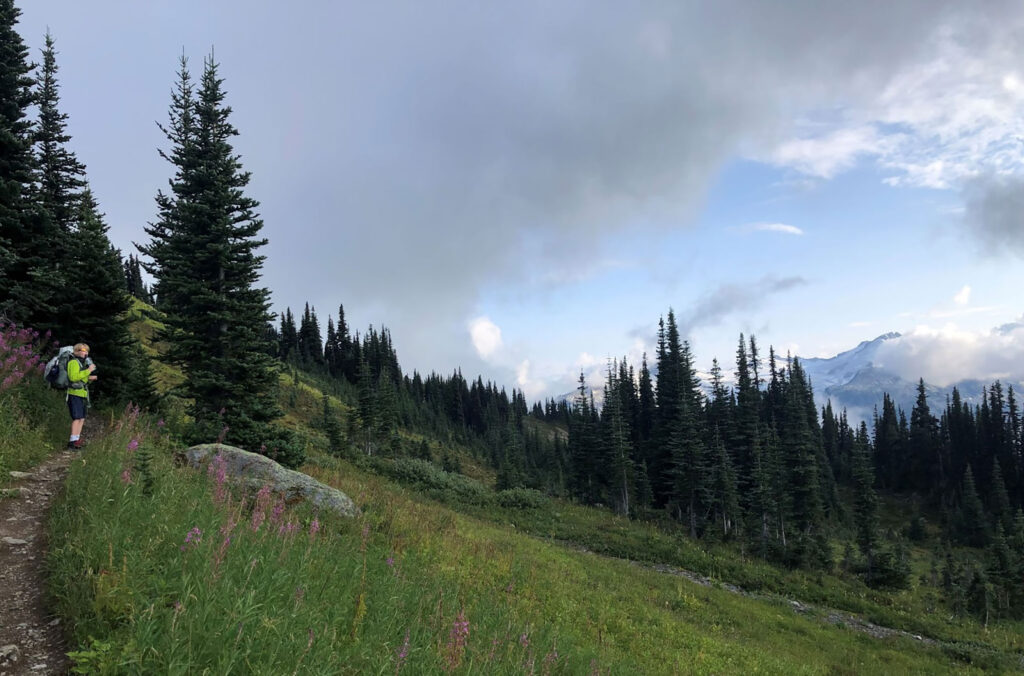
Once you’ve had your fill of the views it’s time to hike, but don’t worry, this whole hike is full of incredible vistas including views over Cheakamus Lake and over to Black Tusk, an ancient volcano. You are looking for the High Note Trail, which leads you to the Musical Bumps Trail and to your destination – Russet Lake. If you’ve been hiking in the sun the glacially-fed waters are a perfect place to cool off (be aware they will be VERY cold).
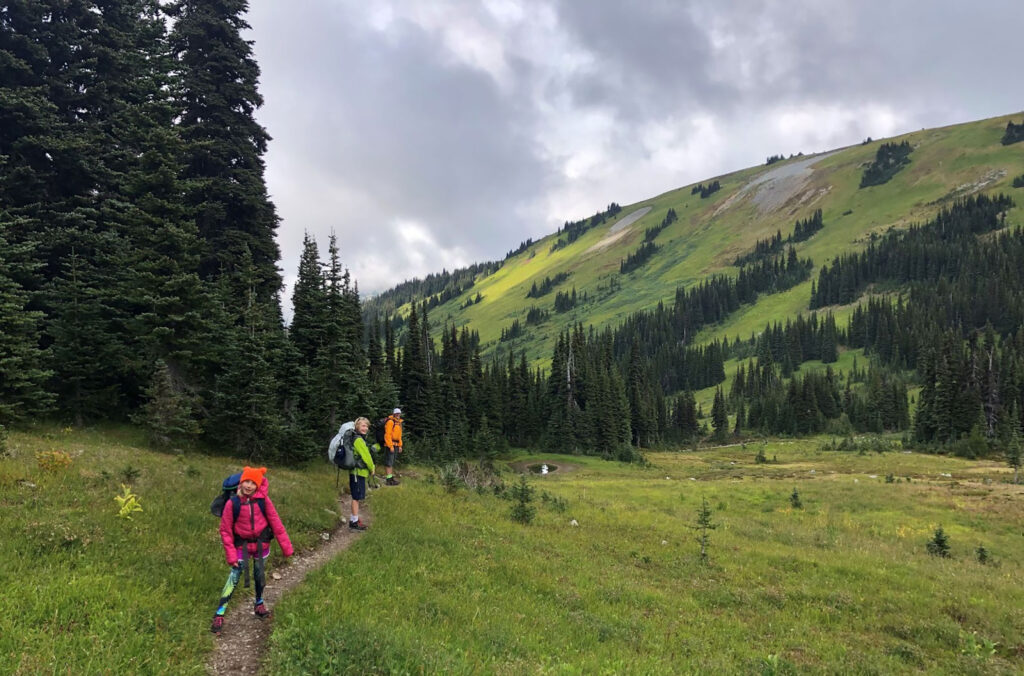
There’s an idyllic stream that runs past the campsite area, the Overlord Glacier glistens in the valley below and the coppery hues of Fissile Peak tower above you. This is a special place.
INSIDER TIP: It’s worth noting that you can also start this hike at the bottom of Whistler Mountain taking the Singing Pass Trail up, but that obviously adds more distance, elevation and time.
Overnight at Russet Lake
As the sun slips over the razor-sharp ridge of the mountain a new chapter begins – nighttime in the mountains. Stars shimmer above your head and the Milky Way slacks across the night sky. Sleeping here is a beautiful, peaceful experience.
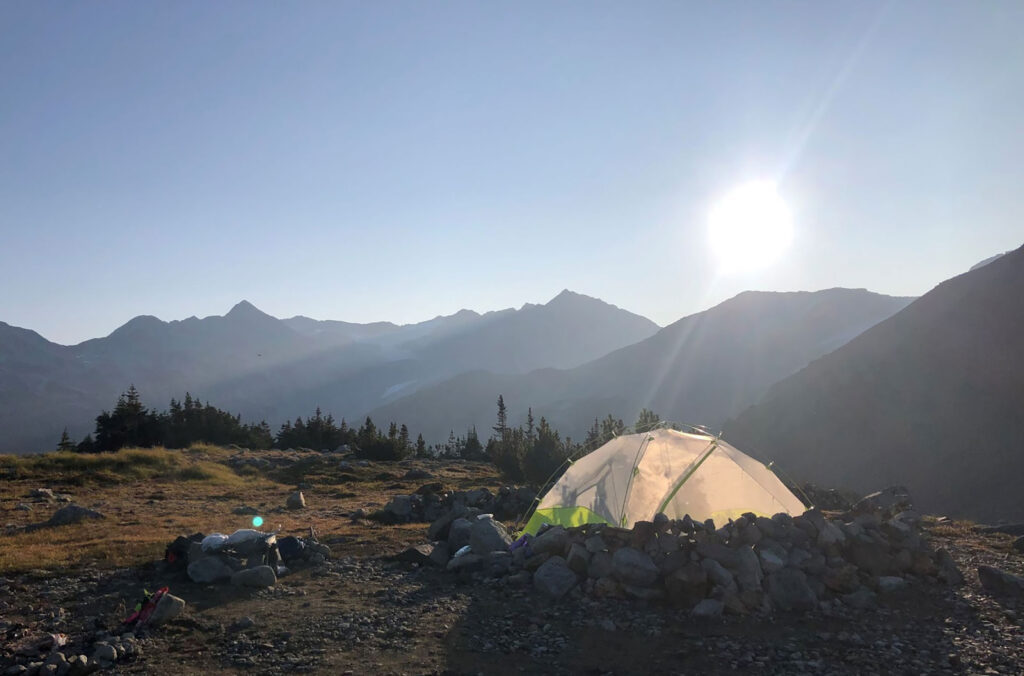
Depending on what month it is, it gets dark around 8:30 PM, so I’d suggest setting up camp as soon as you arrive (you don’t want to be hunting for tent pegs in the dark). It’s best to book your campground ahead of time, which can be done on the BC Parks website (you’ll find Garibaldi Park in the backcountry section).
Returning Home
There are no garbage facilities at Russet Lake so make sure to pack out whatever you packed in. One of the things I like about the hike to Russet Lake is that it’s not a loop and you get to experience the incredible, Coast Mountain views in reverse. However, you can opt to change it up when you get to the turning for the High Note trail and take the path on the right to hike past Symphony and then Harmony lakes. If your thighs can handle more you could also continue on the Singing Pass trail all the way to the base of Whistler Mountain.
What to Bring to Russet Lake
It’s pretty obvious by now that on a hike this big you’re going to need more than just a small backpack. I’m a fan of the saying it’s better to be safe than sorry, meaning it’s better to over pack than to under pack. Take a read of what AdventureSmart BC list as the hiking essentials you should pack when exploring.
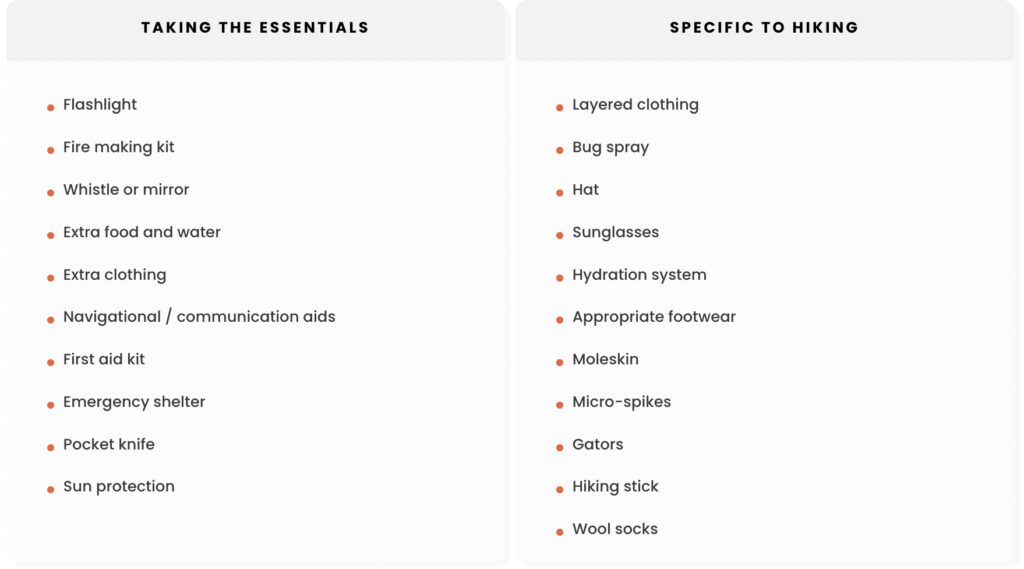
Before embarking on any outdoor adventure, consider downloading the AdventureSmart BC Trip Plan app. Completing a trip plan is extremely important as it contains vital information that assists the authorities when searching for you in the event of an emergency. It explains your destination, travel route, equipment and expected return time. It also gives you some great peace of mind.
One thing I’d suggest bringing on a trip like this is your family. Those friendly arguments between relatives certainly make the experience more lively. It feels good to explore new places together and have shared memories of our time in the mountains.
Happy adventuring!
Book your next winter trip to Whistler now to secure the biggest savings of the season, with up to 65% off lift tickets and 40% off rentals. Stay longer, save more; book seven nights or more and receive a free $100 CAD Dining Voucher. Sign up to be a Rewards by Whistler.com Member and receive a FREE $50 CAD activity voucher on stays of 3+ nights.
Epic Coverage is included for free with the purchase of a day or season pass, so you can plan ahead with peace of mind.
Come experience Whistler Blackcomb’s extensive terrain and adventure at every turn to see why we're known as one of the best resorts on the planet. Secure your mountain getaway with Whistler.com for personalized service and the local knowledge of our Whistler-based team.
